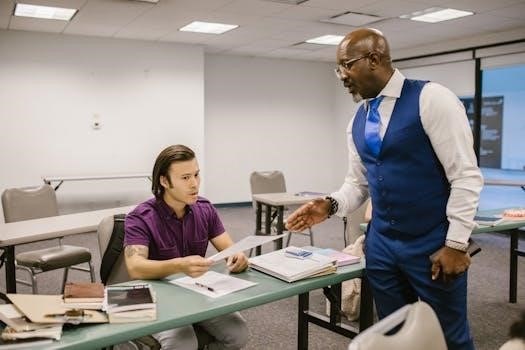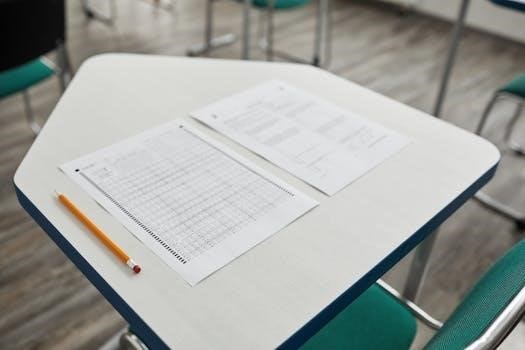Overview of Police Exam Questions
Police entrance exams assess crucial skills for law enforcement. These exams often include written tests‚ math assessments‚ and situational judgment evaluations. They aim to find candidates with the right aptitude and knowledge. Many resources‚ including practice tests‚ are available to help prepare for these exams.
Purpose of Police Entrance Exams
The primary purpose of police entrance exams is to evaluate a candidate’s suitability for law enforcement. These exams are designed to measure a range of essential skills and knowledge necessary for effective policing. They ensure that only those with the requisite abilities are selected‚ maintaining the integrity and professionalism of the police force. These tests assess cognitive abilities‚ including math and reading comprehension‚ alongside critical skills like situational judgment. Exams also verify candidates’ understanding of legal procedures and terminology‚ such as those found in Blackstones Police Manuals. Overall‚ these assessments serve as an impartial tool to filter applicants‚ ensuring that candidates possess the necessary qualifications and are ready to serve the community. They are a crucial part of the hiring process for police departments across various states and municipalities.
Key Areas Covered in Police Exams
Police exams typically cover several key areas to assess a candidate’s overall readiness for law enforcement. These areas include a written exam component‚ which often evaluates grammar‚ spelling‚ and reading comprehension skills. Math skills are also assessed‚ testing basic arithmetic and problem-solving abilities. Situational judgment tests are used to gauge how candidates would respond to real-world scenarios that police officers might encounter. Furthermore‚ some exams may include questions on legal knowledge‚ police procedures‚ and community relations. The specific content can vary between different police departments and jurisdictions. It’s common for tests to feature various types of questions‚ from multiple-choice to open-ended prompts. Familiarizing oneself with these key areas is crucial for successful preparation. This ensures that candidates are well-rounded and possess the necessary skills for the job.

Types of Questions on Police Exams
Police exams feature diverse question types. These include written sections‚ math problems‚ grammar and spelling tests‚ reading comprehension‚ and situational judgment assessments. Preparing for all types is essential.
Written Exam Components
The written components of police exams are designed to measure a candidate’s ability to communicate effectively and understand complex information. These sections often include a variety of question formats‚ such as multiple-choice questions‚ fill-in-the-blank‚ and short-answer responses. The written exam assesses critical thinking and analytical skills. It is very important to achieve a good score in this section to continue the selection process. Candidates must demonstrate proficiency in grammar‚ spelling‚ and vocabulary. Reading comprehension is also a key part of the written exam. This section tests the ability to understand written texts and extract key information. These skills are fundamental for effective police work‚ requiring clarity in report writing and understanding legal documents. Some exams may include essay sections where candidates need to express their thoughts coherently.
Math Skills Assessment

The math skills assessment in police exams evaluates a candidate’s ability to use basic mathematical concepts in real-world scenarios. These questions aren’t designed to be overly complex‚ but focus on practical applications relevant to police work. This section may involve calculations related to crime statistics‚ measuring distances‚ or calculating time and speed. The math questions may include basic arithmetic‚ percentages‚ and simple algebra. A proficiency in mathematical problem-solving is very important. Candidates need to demonstrate accuracy and speed when solving math problems. It is crucial to understand how to apply basic math principles to policing situations. Practice tests often include similar mathematical problems to help candidates prepare for this section. The math section aims to ensure candidates can handle numerical data effectively in their daily duties. These skills are necessary for accurate record keeping and analysis.
Grammar and Spelling Tests
Grammar and spelling tests are a vital part of police exams‚ assessing a candidate’s command of the English language. These tests focus on ensuring that prospective officers can communicate clearly and accurately in written form. The tests evaluate proficiency in sentence structure‚ correct verb usage‚ and proper punctuation. They also assess the ability to identify and correct errors in spelling and grammar. A strong command of language is essential for writing reports and communicating with the public. The grammar and spelling sections include multiple-choice questions and sentence completion tasks. Candidates need to be able to correctly identify misspelled words and grammatical errors. These sections aim to ensure that officers are capable of producing clear and professional written documentation. Attention to detail and accuracy are key to scoring well on these tests. Practice tests with grammar and spelling exercises can be very beneficial.
Reading Comprehension Questions
Reading comprehension questions are a fundamental part of police exams‚ assessing the ability to understand and interpret written information. These questions evaluate a candidate’s capacity to extract key details from passages and draw logical conclusions. The passages may cover a range of topics‚ including legal scenarios‚ policy documents‚ or general information. Candidates are required to read and fully understand the content before answering the related questions. The ability to understand complex texts is vital for police officers in their daily duties. Comprehension questions often include identifying the main idea of a passage and understanding the author’s purpose. These questions assess the candidate’s skill in inferring meaning‚ which is essential for interpreting reports and other documents. Effective reading comprehension is a skill that can be improved with practice and familiarity with various types of texts. Practice tests and exercises can help candidates build their skills.
Situational Judgment Tests
Situational judgment tests (SJTs) are a crucial component of police exams‚ designed to evaluate a candidate’s ability to respond to real-world situations effectively. These tests present scenarios that police officers might encounter on the job and ask candidates to select the most appropriate course of action. SJTs assess critical thinking‚ problem-solving‚ and decision-making skills under pressure. The scenarios often involve ethical dilemmas or interactions with the public. The answers aren’t necessarily right or wrong‚ but are evaluated based on effectiveness. The goal is to find candidates who demonstrate sound judgment and good decision-making abilities. These tests help identify individuals with the capacity to handle complex situations that police officers face. They are designed to evaluate a candidate’s practical judgment rather than just theoretical knowledge. Effective preparation involves understanding the expectations of police work and practicing analyzing different scenarios. SJTs are a valuable tool for assessing candidates’ suitability for law enforcement.

Preparation Strategies for Police Exams
Effective preparation involves utilizing practice tests‚ focusing on skill areas‚ and managing time wisely. Consistent study habits are crucial. Familiarize yourself with the exam format.
Utilizing Practice Tests and Materials
Practice tests are crucial for success on police exams. These resources familiarize you with question formats and content‚ boosting confidence. Many platforms offer customized practice exams designed to mirror the real thing‚ covering written components‚ math‚ grammar‚ and situational judgment. These practice materials often include detailed explanations for answers‚ helping candidates understand concepts and improve their weaknesses. Consistent use of these tools allows for tracking progress and identifying areas needing further focus. PolicePrep‚ for example‚ offers customized exams. Furthermore‚ JobTestPrep provides practice tests specifically for Georgia Peace Officer Exams. Many departments use similar question types‚ and practicing these will give you a competitive edge. Taking free police practice tests can expose you to common questions and boost confidence. These materials are designed to help you achieve optimal test results.
Focusing on Specific Skill Areas
Police exams cover a range of skills‚ so focusing on specific areas is crucial for success. Math skills are frequently tested‚ so practice basic arithmetic and problem-solving. Grammar and spelling are also important‚ requiring attention to detail in written responses. Reading comprehension is another key area‚ requiring the ability to understand and interpret complex text passages. Situational judgment questions assess your ability to make sound decisions under pressure‚ often in hypothetical scenarios; Police exam questions often range from math to situational questions‚ requiring a well-rounded approach. These specific areas should be identified based on individual strengths and weaknesses. Targeted practice‚ such as quizzes covering every aspect of the curriculum‚ can be helpful. Focusing on the specific areas highlighted in the syllabus‚ such as those found in Blackstones Police Manuals‚ is vital.
Importance of Time Management
Time management is a critical skill for success on police exams. Many candidates struggle to complete all sections within the given time limit‚ so effective time management strategies are essential. Practice tests should be timed to help you simulate the real exam conditions. Allocate your time wisely‚ spending more time on sections you find challenging and less on those you’re confident in. Learn to quickly recognize question types and apply the appropriate strategies. Avoid spending too much time on a single question; if you are stuck‚ move on and come back to it later if time allows. Proper time management can significantly improve your performance on the police exam. Regular practice with timed mock exams is essential to refine this skill. It’s not enough to know the material; you must be able to use it effectively under pressure.

Additional Resources and Information
Online platforms offer police exam preparation. State and local departments provide resources. Background checks are important. These resources aid in the application process and enhance readiness for the exam.
Online Police Exam Preparation Platforms
Numerous online platforms offer resources to prepare for police exams‚ catering to various needs and learning styles. These platforms provide practice tests designed to mimic the format and content of actual police entrance exams‚ allowing candidates to familiarize themselves with the types of questions they’ll encounter. Many sites include detailed answer explanations‚ which help candidates understand the reasoning behind correct answers and identify areas for improvement. Some platforms also feature forums or message boards where users can interact‚ ask questions‚ and share study tips. These interactive elements can create a supportive and collaborative learning environment. Additionally‚ platforms often offer access to study guides‚ vocabulary quizzes‚ and even mock interviews‚ providing a comprehensive approach to exam preparation. The convenience and accessibility of online preparation tools make them a valuable resource for aspiring police officers. These online resources aim to boost candidates’ confidence and abilities before taking the actual exams. Furthermore‚ many of these sites offer customized exams for specific police services.
State and Local Police Department Resources
State and local police departments often provide resources to assist candidates preparing for their entrance exams. These resources may include study guides‚ sample test questions‚ and information about the specific exam used by that department. Many departments host informational sessions or workshops to help potential recruits understand the application process and the content of the exam. Some departments provide access to practice tests or offer tips on how to improve test-taking skills. Contacting the local or state police department directly can be a useful way to gather accurate and up-to-date information about the exam and any specific requirements. Departments also often have websites with dedicated sections for recruitment‚ which may include study materials and contact information for recruiters. These resources can be invaluable because they are tailored to the specific exams and criteria used by that particular agency. Candidates are encouraged to reach out to the recruiting officers for any questions they may have. Military personnel may also find resources on their department websites to learn about veteran preference credits.
Importance of Background Checks and Other Requirements
Background checks are a critical component of the police officer selection process‚ ensuring that candidates possess the necessary integrity and character for law enforcement. These checks typically involve a thorough review of an applicant’s criminal record‚ credit history‚ employment history‚ and personal references. The aim is to identify any past behavior or patterns that may make an individual unsuitable for a position of trust and authority. Additionally‚ other requirements‚ such as medical and psychological evaluations‚ are essential to assess the physical and mental fitness of potential officers. These evaluations confirm that candidates are capable of handling the demands of the job and are emotionally stable enough to make sound decisions. Failure to meet any of the required background check standards or other qualifications can result in disqualification from the selection process. These requirements are essential to maintaining the public trust and ensuring that police forces are made up of the most qualified and ethical individuals. The process also includes drug testing.
